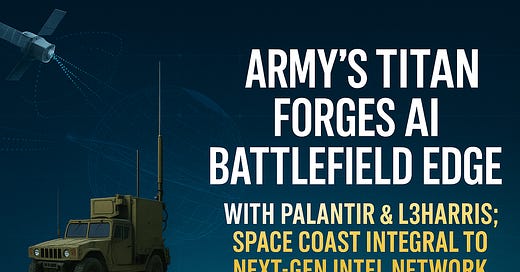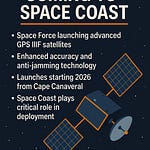Dateline: Palm Bay, FL – May 28, 2025
The U.S. Army is advancing its battlefield intelligence capabilities with the Tactical Intelligence Targeting Access Node (TITAN) program, a mobile ground station system powered by artificial intelligence and machine learning. Driven by a strategic partnership between software innovator Palantir and defense giant L3Harris, this initiative aims to deliver "deep sensing" capabilities and drastically reduce the sensor-to-shooter timeline. L3Harris, a major employer in Brevard County with significant operations in Palm Bay, plays a crucial role in integrating the complex communication systems underpinning TITAN, directly connecting the Space Coast to this national security modernization effort.
Strategic Significance
The TITAN program is more than just new hardware; it represents a “big wager on AI and a future of connected battlespace warfare,” a characterization that highlights the Army's profound strategic pivot. It’s designed as a cornerstone of the Pentagon's broader Combined Joint All-Domain Command and Control (CJADC2) strategy, which seeks to enable faster, more informed decisions than any adversary. TITAN's software-centric acquisition model, where hardware is built around the software, marks a significant departure from traditional defense procurement. This agile approach, utilizing a $178.4 million Other Transaction Authority (OTA) contract for 10 initial prototypes, allowed the Army to rapidly integrate solutions from non-traditional players like Palantir, alongside established firms. The success of TITAN’s prototype delivery—on schedule and on budget—is seen as a blueprint for future defense modernization, crucial for outpacing the AI-driven military advancements of competitors like China.
Local Workforce & Infrastructure Impact
For Brevard County, TITAN’s development brings L3Harris’s local expertise to the forefront. The company, with its expanding Palm Bay campus that includes new space factory investments, serves as the lead communication systems integrator for Palantir on the TITAN program. This role involves providing the bulk of communication assets—from common datalinks and Link 16 to advanced satellite communications capabilities. L3Harris’s established defense expertise and hardware prowess were reportedly key in assuring the government of the program's viability. Though specific TITAN job numbers for Palm Bay are not yet detailed, L3Harris’s broader, significant investments in local space and defense infrastructure powerfully underscore the Space Coast's proven capacity to support and drive such advanced national security programs. Their "Trusted Disruptor" culture, aiming to bring commercial-like agility to DoD projects, aligns perfectly with TITAN's innovative acquisition strategy, a commitment further exemplified by L3Harris's internal utilization of Palantir's Artificial Intelligence Platform (AIP) to enhance its own operational efficiencies.
Technology & Mission Details
TITAN functions as a mobile intelligence ground station, processing vast amounts of sensor data from space, high-altitude, aerial, and terrestrial assets to provide critical intelligence for targeting and situational awareness. Palantir, as the software prime, delivers the AI and machine learning algorithms that enable rapid data processing, enhanced targeting accuracy, and automation to reduce soldier workload. Palantir's contributions include crucial edge computing capabilities, eliminating reliance on vulnerable cloud infrastructure. Their portable Skykit, for instance, allows direct links to space-based sensors for frontline troops.
Beyond TITAN, the Palantir-L3Harris partnership extends to several other cutting-edge initiatives. This includes the "Radio-as-a-Sensor" concept, which transforms tactical radio networks into valuable data sources by integrating Palantir's Foundry with L3Harris's software-defined radios to analyze radio frequency spectrum data for real-time environmental understanding and threat detection. They are also pushing AI capabilities to the operational edge, notably integrating L3Harris's WESCAM MX-20 electro-optical/infrared (EO/IR) imaging system with Palantir's Sensor Inference Platform (SIP). Live fly tests have demonstrated enhanced target detection, improved situational awareness, and reduced operator workload through this edge AI processing. The collaboration further extends to developing solutions for orbital processing on satellites, aiming to improve communication and tactical decision-making at the farthest points of data collection.
L3Harris ensures this sophisticated software can communicate effectively across the multi-domain battlefield. They provide essential communication assets, including military and commercial satellite links, and are collaborating with Palantir on AI-enabled automation and simplified user interfaces to reduce operator burden. This synergy—Palantir's AI processing fused with L3Harris’s resilient communications—aims to help the Army "target earlier, fire faster and engage at farther ranges." The program also intends to consolidate and streamline existing systems, like components of the Distributed Common Ground System-Army (DCGS-A).
What Comes Next
The initial $178.4 million OTA contract covers the delivery of 10 TITAN prototypes—five advanced and five basic versions—with full delivery anticipated by 2026. Notably, the first AI-enabled battlefield intelligence trucks have already been handed over to the Army. Should the program proceed to full-scale deployment, the Army has indicated a potential need for 100 to 150 TITAN units, presenting a potential multi-billion-dollar opportunity for the industry team.
The modular design of TITAN allows for continuous software updates and capability enhancements without costly hardware replacements, a key advantage in the rapidly evolving landscape of AI and military technology. Partners like Anduril, providing hardware components, are also scaling production capabilities, potentially supporting future TITAN demand. The program's success is expected to further validate the software-centric, agile acquisition model for other critical defense programs, solidifying the strategic partnership between Palantir and L3Harris as a blueprint for accelerating AI-powered, data-driven solutions across the defense sector.
This TITAN initiative, with deep roots in the Space Coast's technological capabilities through L3Harris, marks another milestone for our region's leadership in national defense innovation. For Brevard’s workforce, it underscores the growing importance of software, AI, and advanced communications expertise in shaping the future of U.S. military strength.
For more exclusive insights into Space Coast defense programs and aerospace developments, visit and subscribe for free updates directly to your inbox at Space Coast Defense.













Share this post